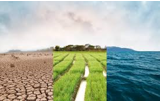INP-WealthPk
Faiza Tehseen
Enhancing forest cover is crucial to tackle the climatic impacts and promote ecological conservation for a sustainable green future.

“Restoring and expanding forests will help reduce the country’s vulnerability to climate change and ensure biodiversity protection,” said Muhammad Saleem, spokesperson of the Ministry of Climate Change and Environmental Coordination. Speaking exclusively to WealthPK, he said: “Over time, Pakistan’s forest cover has been steadily shrinking, leading to significant threats to ecology and biodiversity.
Broader environmental conservation efforts, which majorly entail enhancing the forest cover, are needed to mitigate the climatic impacts.” He maintained that expanding the forest cover can be accomplished through two primary strategies – reforestation, which refers to replanting trees in the areas where forests have been destroyed, and afforestation, which involves planting forests in new areas.
Saleem said: “The government is making efforts to increase forest cover, especially in urban areas, to help address the negative effects of climate change. An expanded forest cover provides vital ecosystem services and can significantly reduce the harmful effects of climate change, such as droughts and floods.” He said that in 2017, the Green Pakistan programme was launched to restore forest cover by planting billions of trees across the country.
“This initiative also promoted sustainable forest management practices. Additionally, the provincial government of Khyber Pakhtunkhwa also spearheaded the Billion Tree Tsunami programme, which gained international recognition.” “The success of these initiatives depends on a coordinated approach involving all the stakeholders,” Saleem emphasised.
Discussing with WealthPK the need for enhanced forest cover for ecological conservation and reducing climatic impacts, Dr Muhammad Akbar, an environmental scientist from Gilgit-Baltistan, said: “Trees play a vital role in combating the rising temperatures, preventing soil erosion, and ensuring an improved air quality. Trees are an essential tool to remove carbon emissions from the atmosphere.
Engagement of communities and other stakeholders is crucial to ensure environmental conservation and protection.” Underscoring the urgency of climate action, Akbar said that a holistic approach was direly needed to safeguard the communities from the severe impacts of climate change. “Pakistan has a rich biodiversity; its protection will not only ensure the sustainable future but will also enhance the resilience of local communities.
It is important to raise public awareness about the critical role of forests in tackling climate change effects, especially in urban areas.” “Forests are the hubs to regulate the water cycles, prevent soil erosion, act as carbon sinks, and provide habitat to numerous species,” said Muhammad Aatif Majeed, Deputy Director (Technical), Pakistan Forest Institute, Peshawar. Talking to WealthPK, he said that Pakistan was among the countries most vulnerable to climate change as it experienced extreme weather events, including heat waves, glacial outbursts, droughts, and floods.
“These events are intensified by low forest cover, reducing land’s ability to absorb carbon dioxide, regulate rainfall patterns, and stabilise temperatures.” Majeed said: “Forests in Pakistan are home to various flora and fauna, some of which are in danger of extinction. Forest loss leads to the destruction of natural habitat of wild animals and other ecosystem aspects that provide services necessary for human survival – pollination, soil fertility, and water purification.”
He said that for the last few decades, Pakistan had been experiencing the alarming deforestation rates due to various reasons – urbanisation, agricultural expansion, logging, and unsustainable land use practices. “By sequestering carbon dioxide, and providing shade to cope with rising temperature, forests act as essential buffers against the climate change.” He said communities play a crucial in forest conservation.
“Community-based forestry projects provide a sustainable livelihood through ecotourism, controlled timber harvesting, and non-timber forest products, including honey, sericulture, nuts, fruits, and medicinal herbs and plants.” “It is necessary to make people aware of the importance of conserving the existing forests and promoting afforestation or reforestation,” Majeed stressed.
Credit: INP-WealthPk




